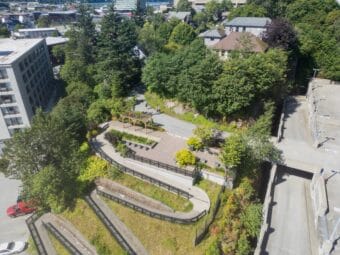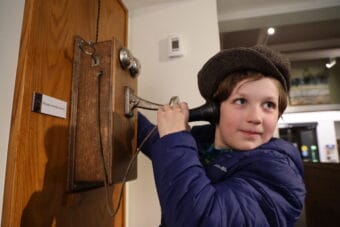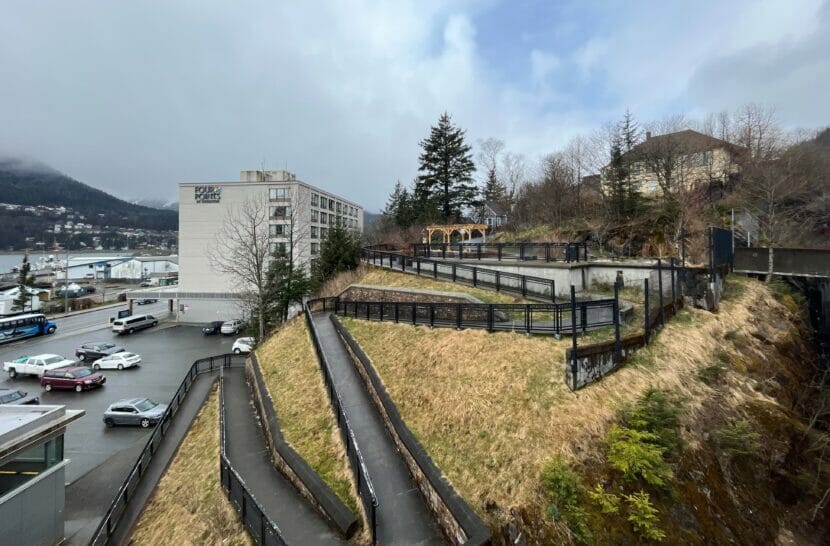
When Tony Tengs took the stage at the Alaska Folk Festival earlier this month, he sang an ode to his Juneau neighborhood, Telephone Hill.
“It’s where the oldest house you’ll find, it’s like you stepped back in time,” he sang. “It’s a breath of fresh air from the hectic scene.”
Tengs knows that oldest house well — he’s rented half of it for 28 years. It’s also the neighborhood’s namesake: Edward Webster and his family ran Alaska’s first commercial telephone service out of the house.
“I call it the West Wing,” Tengs said in an interview inside the home. “I’ve had some fabulous times here.”
Telephone Hill has the kind of neighbors who help you shovel your driveway when it snows and call you if there’s a bear wandering through. Like Tengs, many of them have lived here for decades. But with public meetings on the future of Telephone Hill set to begin this summer, some of them are thinking about their next move and asking the city to delay evictions as long as possible.
The state owned Telephone Hill’s seven houses and one five-unit apartment building from 1984 until this March, when it transferred ownership to the City and Borough of Juneau. The city had applied to buy the land in July 2020.
In that application, City Manager Rorie Watt wrote that the homes were aging and “the land is not being used for highest and best use.”
Then, in January 2022, the city listed redevelopment of Telephone Hill as a legislative priority and sought $2 million for work on the site. According to the project description, that would include “demolition of existing structures.”
Now Tengs’s floor is covered in half-full boxes and musical instrument cases as he prepares to move into Fireweed Place, a nearby apartment community for older adults. But he thinks his neighbors shouldn’t have to move until the city is ready to break ground on whatever comes next.
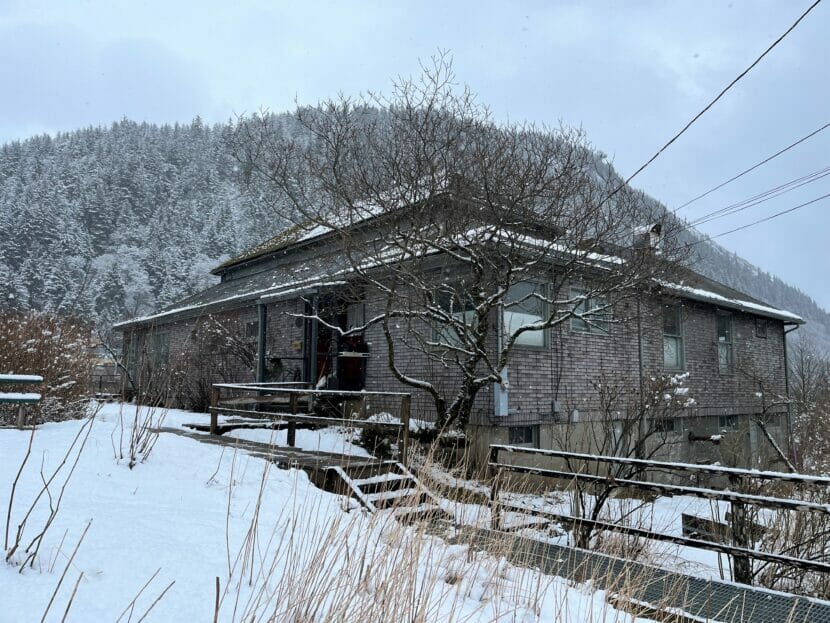
“Good of the many”
The city’s first step as owner was to select a new property manager, JPR Management Services. Their contract lasts through the end of September. JPR will collect rent for the city, and if tenants leave their homes, they’ll let the city know.
“Vacated property will not be rented,” the city’s request for proposals read.
Watt said the land transfer and the selection of a property manager are the latest milestones in a long process.
“I think for the tenants, maybe it’s an increasing sense that change is really likely to happen,” he said.
Watt said it’s likely the city will build new housing on the property, calling it a “once in a lifetime opportunity” to add units in a desirable location downtown. The lack of housing and the rise of short-term rentals have made it harder for Juneau businesses to hire employees.
“I think this is a classic ‘good of the many versus good of the few’ type issue,” Watt said. “I’d like to see several hundred units of housing available for the community on that property. Right now, I think we have 17 people living up there.”
The city has also started negotiating with First Forty Feet for planning and design services for Telephone Hill. Watt expects them to spend three to five months on a redevelopment plan. Public meetings on the planning and design process could begin in early summer.
The city has tasked the planner with considering a “no build” option, too. But Watt said that seems unlikely.
“The Assembly’s goals, which it sets every year, are dominated by housing issues,” he said. “There’s nothing wrong about preserving a historic neighborhood. It just doesn’t meet what we’re trying to do.”
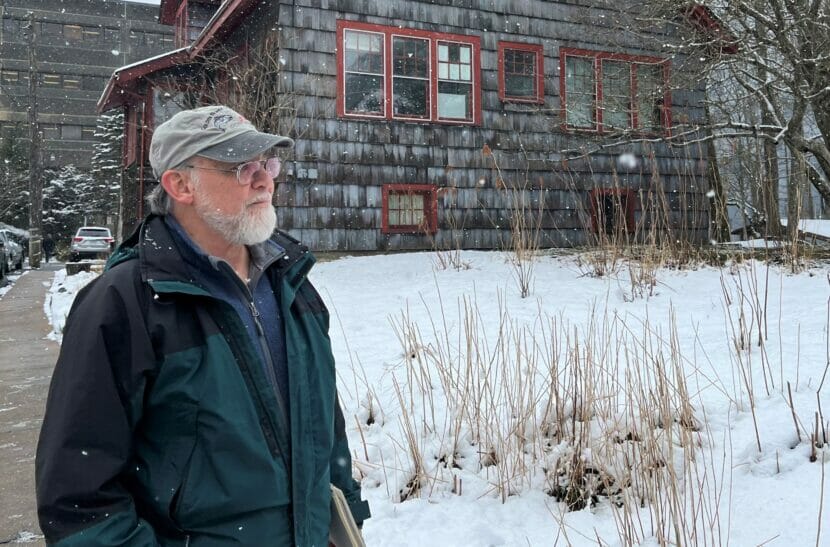
A jewel of history
Some in Juneau, like Skip Gray, are still holding out hope that the city will preserve the existing houses. Gray moved to the neighborhood as a young adult in 1975. He remembers hosting visiting musicians and throwing New Year’s Eve parties.
“I loved living here,” he said, standing in front of his former home. “I had a great group of friends, great group of neighbors. There’s a lot of history in this house.”
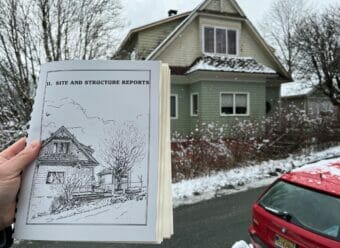
A 1984 study of the neighborhood documents some of that history: the house sits on a lot once owned by Richard Harris, an early prospector and partner of Joe Juneau. Down the street is the Augustus Brown House, named after a landlord who acquired the property in the 1880s and left money to build an indoor pool when he died.
Gray has since moved out of the neighborhood, but he still cares deeply about what happens to Telephone Hill and listens for updates at city meetings.
He says he understands the need for more housing downtown, but he doesn’t think Telephone Hill should be the place to build it. He hopes to organize tenants and community members to raise awareness of the planning process and share their opinions with city leaders.
“This is a great little jewel of history that I think we should hold onto,” Gray said. “If they come with bulldozers and tear these houses down, and I’m standing there watching, I don’t want to say I didn’t try.”
Some tenants, like Roald Simonson, plan to stay as long as they can. He’s lived on Telephone Hill for 20 years, in a bright studio lined wall-to-wall with bookshelves. His cat, Kao, wanders in and out through a window out to the back patio.

Simonson has started keeping an eye out for other housing because, he said, “You have to.” But he has a request for city leaders.
“Just don’t move us off here until you have to,” he said. “Don’t jump the gun and say, ‘Well, we have to get the residents off here for whatever happens,’ and then have things sit for six months, or eight months, or a year, or three years.”
He says he hopes the city picks a redevelopment plan that makes future generations proud.
